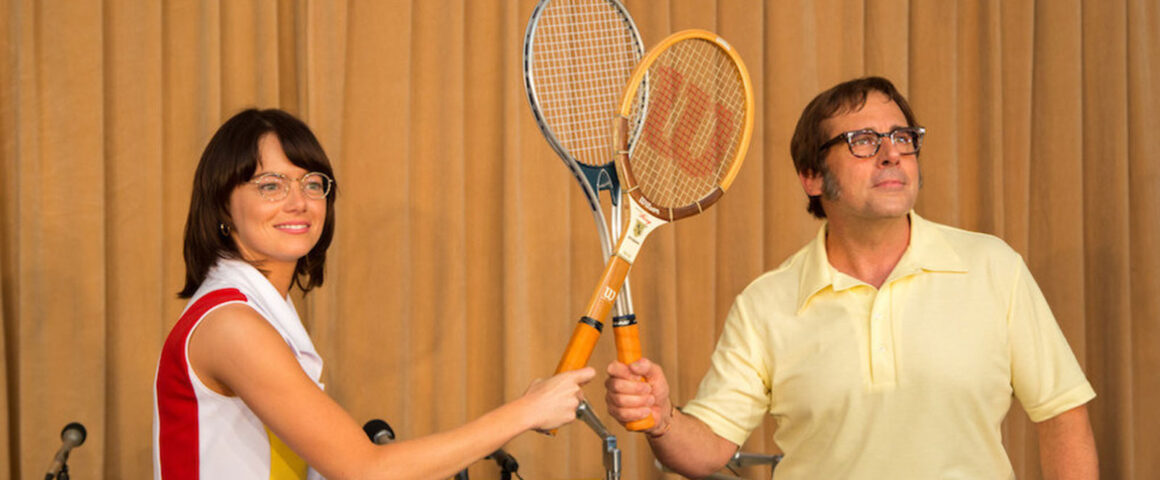It’s probably safe to say, those who remember the explosive tennis court confrontation between Billie Jean King and Bobby Riggs were either exhilarated or exhausted by the gender-clashing sporting event dubbed the “battle of the sexes.” The mega-match, after all, forced the nation to take sides in defense of their gender pride. But what was it really about? Was it an actual cultural event meant to solidify the significance of the Women’s Rights Movement? Could it have been highly touted to question the superiority of men over women in the name of competitive ability? Was it money? Perhaps it was just manufactured hype to increase the interest of the two participants? Well, one could make the argument that all these selections are plausible as both the feminist liberator King and flashy huckster and self-appointed “male chauvinist” Riggs grabbed the spotlight and used it to elevate their personal and professional agendas.
Marital mates and co-directors Valerie Faris and Jonathan Dayton (the film-making duo behind the wonderfully quirky and oddly poignant “Little Miss Sunshine”) with the infectiously offbeat and provocative Battle of the Sexes, delve into the eyebrow-raising, public and private goings-on of the famed exhibition match. Served up with fine energetic performances from Steve Carell (“Foxcatcher”) and last year’s Oscar-winning darling Emma Stone (“La La Land”), Faris and Dayton’s cinematic account of the King-Riggs publicity stunt comes at an opportune time as sexism, gender equality and sports-related controversies have again raised headlines.
Stone’s inspired portrayal of Billie Jean King embodies the feisty spirit of a world class performer (the world’s top women’s tennis player at the time) although her private life was plagued with continual strife. In her position, King experienced unfairness firsthand and questioned the considerable bias in pay scales for men and women, and fought for sexual liberation while harboring a scandalous secret that could ruin her tennis career and reputation — she was bi-sexual and engaged in an affair with Marilyn Barnett (Andrea Riseborough, “Nocturnal Animals”) despite her public image as a wife and relentless warrior on the tennis court.
Carell’s Bobby Riggs, on the other hand, is colorfully buffoonish and insufferably outlandish. Riggs was nobody’s fool as he was self-aware of his rambunctious antics. Beneath the surface of this 55-year old, ragged former Grand Slam men’s champion was a troubled individual seeking attention to mask his complicated backstory of personalized failure and frustration. As with King, we witness Riggs has a double life: He is bogged down with wife Priscilla (Elisabeth Shue, “Chasing Mavericks”) and children yet that does not stop him from fraternizing with other women. He was also a gambling addict indebted to many, and determined the best way out was to use feminist outrage to play into his opportunistic hands.
While Carell and Stone do the heavy lifting as the clashing racket-swinging duo, the supporting cast is also superb and effectively challenging in their roles. Sarah Silverman (“Wreck-It Ralph”) steals the scenes as the crafty magazine publisher, Gladys Heldman, who with King and a handful of other top-rated female tennis stars, looks to form a women’s tennis tour. Riseborough’s Marilyn is both sensual and mysterious as King’s intimate — and hidden — distraction. On-screen spouses to the distracted King and Riggs are quite sympathetic courtesy of Austin Stowell (“Bridge of Spies”) and an especially strong Elisabeth Shue. Jessica McNamee (“The Vow”) is also absolutely winning as Margaret Court, the adversarial competitor to King (and Riggs’s first intended target to taunt) whose disdain gradually turned into mutual respect when the women had to join forces to mobilize the women’s movement to support their endeavor.
With Battle of the Sexes, screenwriter Simon Beaufoy (“Slumdog Millionaire”) has written another contemplative and intriguing film fueled with hearty cynicism, off-kilter frivolity and balanced relevance. Beaufoy does not pigeonhole his lead characterizations or confine them by simple means (e.g., King is noble, Riggs is deplorable). Sure, it is understood how King elevated her credibility as a tennis player and an ardent activist for equal rights, while Riggs paraded around as a deplorable dimwit but actually had the uncanny skill to portray himself as a showman capable of selling blocks of ice to an Eskimo. There is more to them than that, and Beaufoy’s script under Faris and Dayton’s direction allows the audience to tap into the wisdom and warts of both these players and peels back the layers to expose their deep-seated motivations.




'Movie Review: Battle of the Sexes (2017)' has no comments